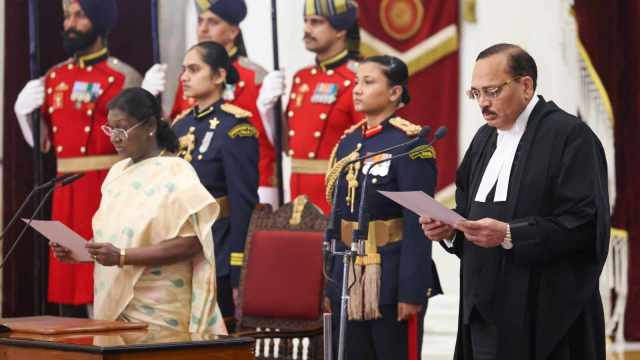From the youngest Advocate General of Haryana to Supreme Court: Justice Surya Kant takes oath as 53rd Chief Justice of India
53rd CJI of India: Justice Surya Kant's term as CJI is expected to involve navigating a wide range of critical issues spanning constitutional law, cyber law, criminal justice, and electoral integrity.
 Justice Surya Kant takes oath in presence of Presidet Droupadi Murmu. (Photo: X@Narendra Modi)
Justice Surya Kant takes oath in presence of Presidet Droupadi Murmu. (Photo: X@Narendra Modi)Justice Surya Kant, who has been part of several landmark judgements, including the abrogation of Article 370, took oath of office as the 53rd Chief Justice of India Monday, succeeding Justice B R Gavai.
President Droupadi Murmu administered the oath of office to Justice Kant, who will remain in office till February 9, 2027, at a ceremony held in Rashtrapati Bhavan. Prime Minister Narendra Modi, his cabinet colleagues, and foreign dignitaries graced the event.
Justice Kant will remain in office for about 14 months, giving his bench time to an extended window to adjudicate several high-profile constitutional and social matters.
While speaking to reporters last Saturday, Justice Kant said his “first and foremost priority is arrears”.
“Today’s scoreboard shows that the Supreme Court arrears is 90,000. I am not going into how it has happened, who is responsible…What is relevant is I must target, knowing well these are the arrears and this is the total force I have. The force today is 33 …Optimum utilisation of that force, that is my first agenda,” he said.
Justice Kant added that there are arrears to be tackled across courts in the country. “One is arrears in SC. Other is arrears on pan-India basis, in High Courts or District Courts. I have to address that also.”
As a Supreme Court judge, Justice Kant has contributed to several significant decisions, and his term as CJI is expected to involve navigating a wide range of critical issues spanning constitutional law, cyber law, criminal justice, and electoral integrity.
Hailing from Haryana, Justice Kant graduated from the Government Post Graduate College, Hisar, in 1981. He earned his Bachelor of Laws degree in 1984 from Maharishi Dayanand University, Rohtak, and started practising law at the Hisar District Court.
From Punjab and Haryana High Court to Supreme Court
Justice Kant then moved to Chandigarh in 1985 to practice in the Punjab and Haryana High Court, where he specialised in Constitutional, Service, and Civil matters.
He was designated as Senior Advocate in March 2001, and remained Advocate General, Haryana, till his elevation as a permanent judge of the Punjab and Haryana High Court on January 9, 2004. Justice Kant earned the distinction of being appointed the youngest Advocate General of Haryana on July 7, 2000.
Justice Kant assumed office as Chief Justice of the Himachal Pradesh High Court on October 5, 2018, and was elevated to the Supreme Court on May 24, 2019.
Justice Surya Kant was part of the bench that upheld the abrogation of Article 370, which conferred special status on the erstwhile Jammu and Kashmir state, and the recent Constitution Bench ruling, which said that no timelines can be fixed for the President and Governor to act on Bills of state legislatures.
He also shared the bench, which kept colonial-era sedition law in abeyance and ordered against the filing of fresh First Information Reports (FIRs) till the government reviewed the clause.
Taking corruption head-on, another bench presided by him had asked the Central Bureau of Investigation (CBI) to probe the alleged nexus between builders and banks and financial institutions, to the detriment of homebuyers, in the National Capital Region (NCR), and subsequently give the go-ahead to file FIRs.
A bench presided by him is currently monitoring the rollout of the Special Intensive Revision of electoral rolls across the country.



- 01
- 02
- 03
- 04
- 05




























